Dissertation Solutions
A Concise Guide to Planning,
Implementing, and Surviving the
Dissertation Process
Bradley N. Axelrod and James Windell
ROWMAN & LITTLEFIELD EDUCATION
A division of
ROWMAN & LITTLEFIELD PUBLISHERS, INC.
Lanham New York Toronto Plymouth, UK
Published by Rowman & Littlefield Education
A division of Rowman & Littlefield Publishers, Inc.
A wholly owned subsidiary of The Rowman & Littlefield Publishing Group, Inc.
4501 Forbes Boulevard, Suite 200, Lanham, Maryland 20706
www.rowman.com
10 Thornbury Road, Plymouth PL6 7PP, United Kingdom
Copyright 2012 by Bradley N. Axelrod and James Windell
All rights reserved. No part of this book may be reproduced in any form or by any electronic or mechanical means, including information storage and retrieval systems, without written permission from the publisher, except by a reviewer who may quote passages in a review.
British Library Cataloguing in Publication Information Available
Library of Congress Cataloging-in-Publication Data
Axelrod, Bradley N., 1961
Dissertation solutions : a concise guide to planning, implementing, and surviving the dissertation process / Bradley N. Axelrod and James Windell.
p. cm.
Includes bibliographical references.
ISBN 978-1-61048-867-9 (pbk. : alk. paper) -- ISBN 978-1-61048-868-6 (electronic)
1. Dissertations, Academic--Handbooks, manuals, etc. 2. Proposal writing in research--Handbooks, manuals, etc. 3. Academic writing--Handbooks, manuals, etc. I. Windell, James, 1940- II. Title.
LB2369.A94 2012
808.06'6378--dc23
2012028665
 The paper used in this publication meets the minimum requirements of American National Standard for Information Sciences Permanence of Paper for Printed Library Materials, ANSI/NISO Z39.48-1992.
The paper used in this publication meets the minimum requirements of American National Standard for Information Sciences Permanence of Paper for Printed Library Materials, ANSI/NISO Z39.48-1992.
Printed in the United States of America
To Robin, my best friend and loving wife.
B. N. A.
To Jane, my adorable wife.
J. W.
Acknowledgments
Acknowledgments Acknowledgments
This book would not be possible without the contributions of many people. In particular, we were fortunate to be able to draw on the experiencesboth positive and negativeof many graduate students, interns, and former graduate students who have now attained their PhDs.
Although it is not possible to list every person who helped us in one way or another, we would be remiss to fail to acknowledge the help of the following people: Aaron D. Anderson; Douglas Campbell, PhD; Anne M. Conway; Julia Delektra, M.A.; Patricia B. Espe-Pfeifer; Jeffrey Evans, PhD; Melissa Grey, PhD; Joseph F. Kulas, PhD; Greg J. Lamberty, PhD; Scott W. Larson, PhD; Anthony Lequerica, PhD; Samuel Liebman, PhD; Mary Mahrou, PhD; Sylvia Malcore, PhD; Tamara McKay, PhD; Deborah Meizlish; Steve T. Michael, M.A.; Jenn Raiter, PhD; Lisa J. Rapport, PhD; Gregory Spence-Jones, PhD; David P. Sandrow; Nicole Tacoma, PhD; and Lily Trewhella, M.A. Each of these individuals shared their troubles and triumphs as graduate students on the way to completing their dissertations.
In addition, we want to thank Laurie Miller, M.A.; Elizabeth Hill, PhD; Pamela E. May, M.A.; and Joseph Ryan, PhD; all of whom were kind enough to read portions of the book, refer graduate students we could interview, or make valuable suggestions for revising chapters.
Finally, we thank our families (Robin, Robert, Ari; Jane) who support our professional work with the same vigor as they do our home lives.
Introduction
Introduction Introduction
Oh boy! Now you have really done it! You decided to go ahead and get an advanced degree. You may have realized that you would need to do a dissertation and even a formal research project, but you were not aware of what that would entail. Sure, your professors, advisers, classmates, and friends have told you what they think you should do. However, that is a far cry from actually jumping in and understanding all the potential ins and outs of the dissertation process.
Thus far in your graduate education you have attended classes, completed assignments, and done what every instructor requested. You already know that your masters thesis or your doctoral dissertation will be unlike any other project youve ever taken on. And you certainly have an inkling that it will be more time-consuming than any of the projects you have completed so far. But, it is different in other ways as well. Our goal in this book is to make the whole process of planning, researching, and writing your dissertation a little more manageable.
Most important, if you are required to do a research project as part of your dissertation then it will be work that will be of your own choosingor it will be work that is conducted with the assistance of your faculty adviser. You will, however, need approval for almost all aspects of your study.
Provided that your study is deemed acceptable, you will be doing the background reading, study design, data collection, statistical analyses, and formal write-up of an area that you have selected. In addition, you will be working on a schedule that is somewhat of your own making. That is, you will do the reading and writing, find the participants, create your database, and otherwise meet all of the needs of your study at your own rate. Many people at this point in their graduate education find this flexibility quite liberating.
But all is not a bed of roses. There are a number of obstacles that you will need to overcome to achieve the final goal of completing your research project, thesis, or dissertation. Just as in many video games, each step of the process has some hidden trap, and around every corner lurks some kind of obstacle. Although not mortally fatal, the threats that exist could certainly kill ones spirit and enthusiasm for completing the degree. Wouldnt it be wonderful if you could learn about the hazards in the complete dissertation process as easily as you can pick up the magazines written for video game solutions or Smartphone apps for game cheats?
Although we are not able to find you a quick cheat to give you the fast solution, our intent is to get you on the right track. We would like this book to be a manual and a guideline that will let you know about the roadblocks, traps, landmines, and hazards that could delay your ultimate goal of finishing a dissertation.
The purpose of this book is to give you some of the basic tools and tricks of the trade to get you through the process with minimal hassle. A golfer cant avoid landing in a sand trap or some other hazard. But, with the right knowledge, the golfer will avoid the hazard... or know how to get out of it quickly. Similarly, this text will not be able to prevent you from encountering the hazards that present themselves in the process of writing a proposal, finishing the dissertation, and getting it accepted as the final step in earning your PhD However, our goal is to pass along sufficient information so that you will be able to identify the traps ahead of time, avoid some of the hazards before they occur, and learn how to attack the most significant roadblocks directly and successfully.
In this book, we have selected a number of different topics that current and former graduate students presented to us. These areas are all sources of potential derailment in the dissertation process. The most heinous horror stories as well as the more mundane irritants are interspersed to serve as examples to learn from. You will find that the chapters are quite brief, as the goal was to present nuggets of relevant information. In most cases, the chapters can be read in any order as each one has information that is self-contained. If you have questions about forming a dissertation committee or dealing with your own procrastination, for instance, feel free to jump to that section and extract the needed information. The book is yours. How you use it is also up to you.



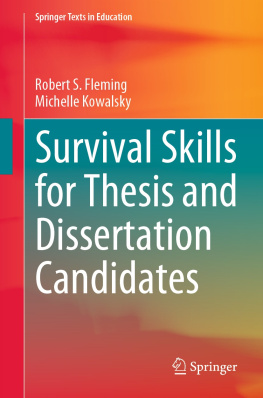
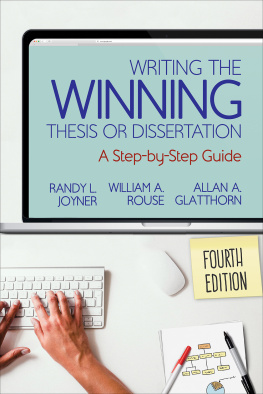
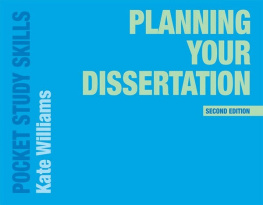
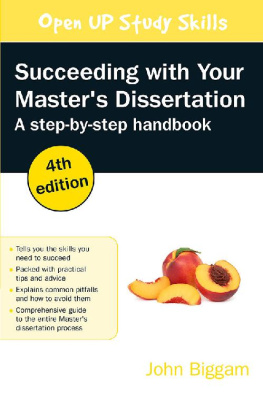
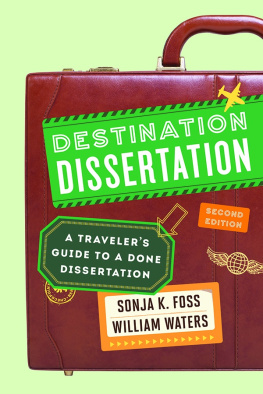
 The paper used in this publication meets the minimum requirements of American National Standard for Information Sciences Permanence of Paper for Printed Library Materials, ANSI/NISO Z39.48-1992.
The paper used in this publication meets the minimum requirements of American National Standard for Information Sciences Permanence of Paper for Printed Library Materials, ANSI/NISO Z39.48-1992.